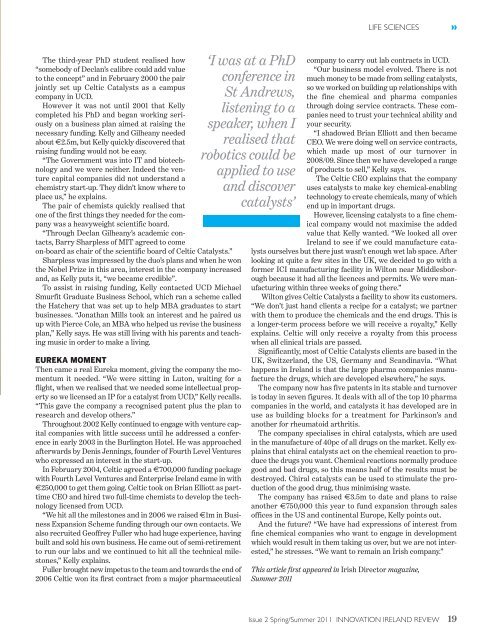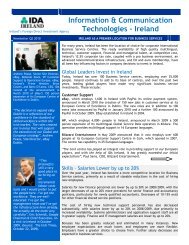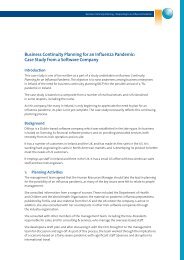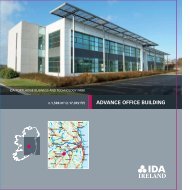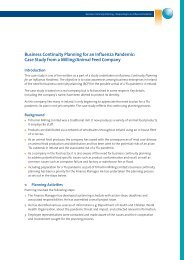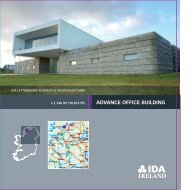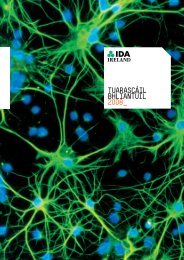Creativity - IDA Ireland
Creativity - IDA Ireland
Creativity - IDA Ireland
You also want an ePaper? Increase the reach of your titles
YUMPU automatically turns print PDFs into web optimized ePapers that Google loves.
LIFE SCIENCES »<br />
The third-year PhD student realised how<br />
“somebody of Declan’s calibre could add value<br />
to the concept” and in February 2000 the pair<br />
jointly set up Celtic Catalysts as a campus<br />
company in UCD.<br />
However it was not until 2001 that Kelly<br />
completed his PhD and began working seriously<br />
on a business plan aimed at raising the<br />
necessary funding. Kelly and Gilheany needed<br />
about €2.5m, but Kelly quickly discovered that<br />
raising funding would not be easy.<br />
“The Government was into IT and biotechnology<br />
and we were neither. Indeed the venture<br />
capital companies did not understand a<br />
chemistry start-up. They didn’t know where to<br />
place us,” he explains.<br />
The pair of chemists quickly realised that<br />
one of the first things they needed for the company<br />
was a heavyweight scientific board.<br />
“Through Declan Gilheany’s academic contacts,<br />
Barry Sharpless of MIT agreed to come<br />
on-board as chair of the scientific board of Celtic Catalysts.”<br />
Sharpless was impressed by the duo’s plans and when he won<br />
the Nobel Prize in this area, interest in the company increased<br />
and, as Kelly puts it, “we became credible”.<br />
To assist in raising funding, Kelly contacted UCD Michael<br />
Smurfit Graduate Business School, which ran a scheme called<br />
the Hatchery that was set up to help MBA graduates to start<br />
businesses. “Jonathan Mills took an interest and he paired us<br />
up with Pierce Cole, an MBA who helped us revise the business<br />
plan,” Kelly says. He was still living with his parents and teaching<br />
music in order to make a living.<br />
EUREKA MOMENT<br />
Then came a real Eureka moment, giving the company the momentum<br />
it needed. “We were sitting in Luton, waiting for a<br />
flight, when we realised that we needed some intellectual property<br />
so we licensed an IP for a catalyst from UCD,” Kelly recalls.<br />
“This gave the company a recognised patent plus the plan to<br />
research and develop others.”<br />
Throughout 2002 Kelly continued to engage with venture capital<br />
companies with little success until he addressed a conference<br />
in early 2003 in the Burlington Hotel. He was approached<br />
afterwards by Denis Jennings, founder of Fourth Level Ventures<br />
who expressed an interest in the start-up.<br />
In February 2004, Celtic agreed a €700,000 funding package<br />
with Fourth Level Ventures and Enterprise <strong>Ireland</strong> came in with<br />
€250,000 to get them going. Celtic took on Brian Elliott as parttime<br />
CEO and hired two full-time chemists to develop the technology<br />
licensed from UCD.<br />
“We hit all the milestones and in 2006 we raised €1m in Business<br />
Expansion Scheme funding through our own contacts. We<br />
also recruited Geoffrey Fuller who had huge experience, having<br />
built and sold his own business. He came out of semi-retirement<br />
to run our labs and we continued to hit all the technical milestones,”<br />
Kelly explains.<br />
Fuller brought new impetus to the team and towards the end of<br />
2006 Celtic won its first contract from a major pharmaceutical<br />
‘I was at a PhD<br />
conference in<br />
St Andrews,<br />
listening to a<br />
speaker, when I<br />
realised that<br />
robotics could be<br />
applied to use<br />
and discover<br />
catalysts’<br />
company to carry out lab contracts in UCD.<br />
“Our business model evolved. There is not<br />
much money to be made from selling catalysts,<br />
so we worked on building up relationships with<br />
the fine chemical and pharma companies<br />
through doing service contracts. These companies<br />
need to trust your technical ability and<br />
your security.<br />
“I shadowed Brian Elliott and then became<br />
CEO. We were doing well on service contracts,<br />
which made up most of our turnover in<br />
2008/09. Since then we have developed a range<br />
of products to sell,” Kelly says.<br />
The Celtic CEO explains that the company<br />
uses catalysts to make key chemical-enabling<br />
technology to create chemicals, many of which<br />
end up in important drugs.<br />
However, licensing catalysts to a fine chemical<br />
company would not maximise the added<br />
value that Kelly wanted. “We looked all over<br />
<strong>Ireland</strong> to see if we could manufacture catalysts<br />
ourselves but there just wasn’t enough wet lab space. After<br />
looking at quite a few sites in the UK, we decided to go with a<br />
former ICI manufacturing facility in Wilton near Middlesborough<br />
because it had all the licences and permits. We were manufacturing<br />
within three weeks of going there.”<br />
Wilton gives Celtic Catalysts a facility to show its customers.<br />
“We don’t just hand clients a recipe for a catalyst; we partner<br />
with them to produce the chemicals and the end drugs. This is<br />
a longer-term process before we will receive a royalty,” Kelly<br />
explains. Celtic will only receive a royalty from this process<br />
when all clinical trials are passed.<br />
Significantly, most of Celtic Catalysts clients are based in the<br />
UK, Switzerland, the US, Germany and Scandinavia. “What<br />
happens in <strong>Ireland</strong> is that the large pharma companies manufacture<br />
the drugs, which are developed elsewhere,” he says.<br />
The company now has five patents in its stable and turnover<br />
is today in seven figures. It deals with all of the top 10 pharma<br />
companies in the world, and catalysts it has developed are in<br />
use as building blocks for a treatment for Parkinson’s and<br />
another for rheumatoid arthritis.<br />
The company specialises in chiral catalysts, which are used<br />
in the manufacture of 40pc of all drugs on the market. Kelly explains<br />
that chiral catalysts act on the chemical reaction to produce<br />
the drugs you want. Chemical reactions normally produce<br />
good and bad drugs, so this means half of the results must be<br />
destroyed. Chiral catalysts can be used to stimulate the production<br />
of the good drug, thus minimising waste.<br />
The company has raised €3.5m to date and plans to raise<br />
another €750,000 this year to fund expansion through sales<br />
offices in the US and continental Europe, Kelly points out.<br />
And the future? “We have had expressions of interest from<br />
fine chemical companies who want to engage in development<br />
which would result in them taking us over, but we are not interested,”<br />
he stresses. “We want to remain an Irish company.”<br />
This article first appeared in Irish Director magazine,<br />
Summer 2011<br />
Issue 2 Spring/Summer 2011 INNOVATION IRELAND REVIEW 19


